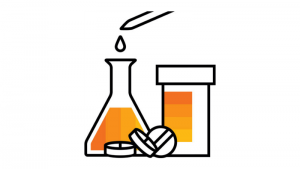
“Blockchain is driving a new breed of enterprise applications that could drastically improve cooperation for wholesale distribution,” said Jeffery Denton, senior director, Global Secure Supply Chain, AmerisourceBergen Corporation. “The blockchain-based solution from SAP provides the best opportunity to fully satisfy our need to be interoperable with our trading partners and their solutions as well as to remain compliant with the U.S. DSCSA.”

Reauthenticating drugs
US wholesalers encounter nearly 60 million pharmaceutical returns annually. This has an estimated value of US$7 billion. This speaks only for the US: add Canada, Japan plus the EU and the figure is probably nearer US$15B+.
SAP’s new software enables customers to verify:
- the product code
- lot
- expiration date.
The hub accomplishes this by:
- exploiting a unique serial number embedded in the barcode
- referencing this to manufacturers’ data stored on the hub blockchain.
SAP developed the software in co-innovation with AmerisourceBergen, Boehringer Ingelheim, GlaxoSmithKline and Merck Sharp & Dohme, among others.

The blockchain-based solution helps customers comply with the U.S. Drug Supply Chain Security Act (DSCSA). This requires that, as of November 2019, wholesalers verify returned prescription drugs they would like to resell. The intention of this legal mandate is to protect consumers from fake, contaminated and stolen medication.
Dr. Oliver Nuernberg, chief product owner, SAP for Life Sciences solution portfolio, SAP SE. said: “This blockchain product supports the industry’s need for an immutable and shared ledger, avoiding many complex integrations. With this product we are offering a scalable and secure solution to pharmaceutical manufacturers and U.S. wholesalers to comply with the upcoming regulatory requirements for verification.”
SAP blockchain
SAP’s involvement in blockchain has multiple facets. First of all it claims to be business process centered which seeks to focus beyond the technology. This involves:
- the creation of use cases, business value, and processes where there is likely to be an impact.
- combining a digital core with an active business network
SAP’s blockchain has a cloud dimension, including a BaaS abstraction layer. This (abstraction layer):
- supports open standards
- offers built-in integration with SAP applications.
One advantages of SAP’s cloud platform blockchain service is that enterprises to experiment with blockchain. The blockchain-as-a-service offering is a (relatively) low-cost, low-risk way for businesses to explore the technology and how it might integrate it into existing SAP implementations.
Enterprise Times: what does this mean
SAP supports activities across multiple industries which exploring what blockchain, or distributed ledger technology (DLT), can offer. In 2018, SAP announced new industry consortia within the SAP Blockchain Consortium program:
- SAP High Tech Industry Blockchain Consortium
- SAP Consumer Goods, Retail and Agribusiness Industry Blockchain Consortium
- SAP Life Science and Pharmaceutical Industry Blockchain Consortium.
Arguably the addition of such consortia is proof of the SAP blockchain efforts to identify the most relevant or appropriate platform, framework and organisation for enterprises seeking to adopt and integrate DLT technology. This DSCSA-led initiative is a narrow but practical exploitation of blockchain, albeit in a permissioned environment.


























